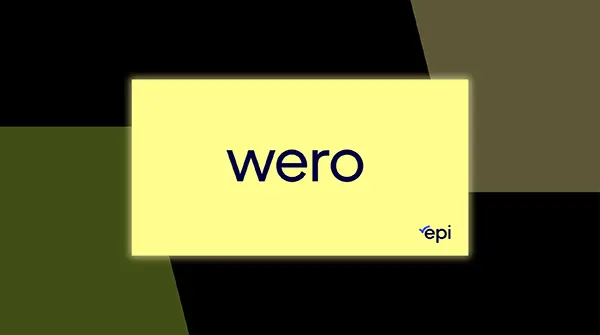
Wero (EPI Wallet) – The European Universal Digital Wallet
Wero, also known as the European Payments Initiative (EPI) Wallet, is a project designed to create a unified and secure digital wallet solution for Europe. By 2025, this initiative has moved from development to early adoption, offering consumers and businesses a reliable alternative to fragmented payment systems. The goal of Wero is to simplify digital transactions across the European Union while strengthening financial independence from non-European providers.
What Is Wero (EPI Wallet)?
Wero is a digital wallet developed under the European Payments Initiative, backed by a consortium of major European banks and payment service providers. It aims to offer a universal solution for everyday payments, peer-to-peer transfers, and e-commerce transactions across the EU. Unlike private wallets dominated by global tech companies, Wero is built with a focus on European financial sovereignty and regulatory compliance.
The wallet is designed to integrate seamlessly with existing bank accounts, ensuring that users can link their preferred financial institutions directly without third-party intermediaries. This makes it both practical and secure, with compliance aligned to the EU’s strict data protection and financial regulations.
As of 2025, Wero is operational in several EU member states, with plans to expand its coverage to all participating countries. It is positioned not only as a payment tool but also as a future-ready infrastructure for digital identity, loyalty programmes, and even public services.
Key Features of Wero
Wero allows peer-to-peer money transfers between EU residents instantly, regardless of the country or bank involved. This is achieved through direct connections to the SEPA Instant Credit Transfer network, ensuring low-cost and near-instant cross-border payments. For users, this means sending money abroad is as simple as a domestic transfer.
The wallet also supports integration with retail payments, both in-store and online, offering merchants a European-controlled alternative to international card schemes. Thanks to its QR-based and NFC-enabled payments, it is practical for everyday use, from small purchases to large transactions.
Security is central to the wallet’s design, with strong authentication methods, biometric support, and full compliance with PSD2 regulations. This ensures users can trust Wero for sensitive financial operations without exposure to unnecessary risks.
How Wero Supports European Financial Independence
One of the main motivations behind Wero is to reduce Europe’s dependence on non-EU payment providers, particularly American card networks and large tech companies. By offering a pan-European wallet, the EU strengthens its autonomy in financial infrastructure while supporting domestic innovation in fintech.
For consumers, this translates into more choice and transparency. Instead of relying on wallets operated outside European jurisdiction, users gain a trusted alternative that is regulated locally and designed with European interests in mind. This approach ensures that both personal data and financial flows remain within European governance structures.
For businesses and merchants, Wero creates a unified standard that reduces reliance on multiple payment service providers. This contributes to lower transaction fees and improved efficiency, especially for cross-border trade within the EU’s single market.
Adoption and Market Outlook
By 2025, Wero has already been rolled out in France, Germany, and Belgium, with pilot programmes underway in Spain, the Netherlands, and Italy. The phased rollout is intended to ensure technical stability and regulatory alignment before full-scale adoption. The EU is strongly encouraging member states to support the wallet as part of its broader financial digitalisation strategy.
Consumer adoption is expected to rise steadily, as banks and retailers continue to integrate Wero into their systems. Analysts predict that by 2030, it could become one of the most widely used digital wallets in Europe, covering millions of users and businesses across the continent.
While challenges remain, particularly in competing with well-established global wallets, the political and financial backing from EU institutions and major European banks positions Wero as a long-term player in the digital payments landscape.

Future Developments and Challenges
Looking ahead, Wero is not only about payments. Plans are underway to expand its capabilities into digital identity verification, enabling secure logins for government services, healthcare, and private platforms. This would make Wero a multi-purpose tool beyond finance, increasing its value to everyday users.
Another potential area of growth is integration with central bank digital currencies (CBDCs). The European Central Bank has been exploring the digital euro, and Wero could serve as a natural distribution channel for such an initiative, ensuring accessibility and usability across the Union.
Nevertheless, challenges exist, such as persuading consumers to switch from established international wallets, ensuring full interoperability across all EU countries, and maintaining the highest security standards. Addressing these issues will determine the wallet’s success in the coming years.
The Role of Regulation and Trust
The success of Wero is tied to the trust it can build with European citizens. Transparency, strong consumer protection, and strict adherence to EU regulations are key elements of its long-term strategy. Users must feel confident that their money and personal data are safeguarded under European laws.
At the same time, the EU and participating banks must ensure that Wero remains competitive in terms of user experience, transaction costs, and convenience. If it falls behind in these areas, adoption could stagnate despite regulatory support.
Ultimately, Wero represents an important step towards financial sovereignty in Europe. By 2025, it has already proven its potential, and the next decade will show whether it can achieve its ambition of becoming a truly universal European wallet.
